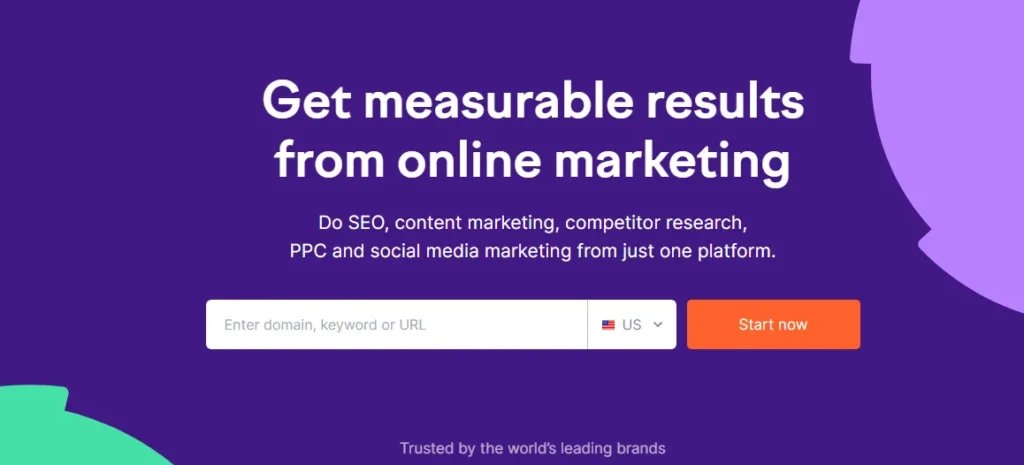Guide to Keyword Research: Rank On Google and Bing
Keyword research serves as the cornerstone of successful SEO (Search Engine Optimization) strategies.
Its fundamental purpose is to identify the phrases and words that people type into search engines, such as Google, Bing, and Yahoo.
As a content creator or website owner, understanding what your target audience is searching for, analyzing those keywords, and strategizing your content around them is key to driving organic traffic to your site.
To do keyword research effectively, you must understand not only the mechanics of SEO but also the art of captivating your readers.
Keyword research combines these two aspects, making it a unique skill that takes time to master.
Professional SEO experts have honed this skill over time and used it to propel their websites to the top of search engine rankings.
Just as we learn to use tools for different tasks, understanding the basics of keyword research is like learning to navigate a new software program or learning a new language.
And like any other skill, mastering keyword research takes time, patience, and continuous learning.
How To Do Keyword Research: Step-by-Step Process of Conducting Keyword Research
Conducting keyword research is a fundamental part of Search Engine Optimization (SEO). This is more than merely generating a list of keywords that are somehow connected to your niche or industry; it is a meticulous and strategic process.
This process involves understanding your audience, identifying keywords pertinent to your business, evaluating their competitive nature, and ultimately incorporating them into your content creation strategy.
This comprehensive guide will walk you through the entire keyword research process in an actionable, human-friendly manner, breaking it down into easy-to-follow steps.
1. Know Your Audience Inside and Out
The first and arguably the most important step in keyword research is to truly understand your audience. This understanding sets the foundation for the entire keyword research process.
Investigate who your audience is, what their interests are, what they are searching for online, and the specific language they use when they do so. All these insights will help you identify keywords that will genuinely resonate with them.
To gain these insights, utilize tools like Google Analytics, conduct surveys, engage with your audience on social media, and evaluate customer feedback. All these resources can provide valuable insights into your audience’s behavior and preferences, which can guide your keyword strategy.
2. Brainstorm Initial Keyword Ideas

Having established a strong understanding of your audience, you can now start generating keyword ideas. Ponder upon the topics your audience is likely interested in and the language they would typically use to search for these topics.
Draw upon your industry knowledge, insights about your audience, and any other relevant information to formulate a preliminary list of keyword ideas. This list is just the starting point of your keyword research journey, but it’s essential.
3. Harness the Power of Keyword Research Tools

After brainstorming your initial keyword ideas, you’re ready to delve deeper with the help of keyword research tools. These tools can generate additional keyword suggestions, and provide valuable data about their search volume, competitiveness, and relevance to your content.
There’s a plethora of keyword research tools available, including but not limited to Google Keyword Planner, Moz’s Keyword Explorer, SEMRush, Ahrefs, and Ubersuggest. Each of these tools has unique features and benefits, so choose the ones that suit your needs the best. You can also use a combination of tools for an even more comprehensive approach.
4. Delve Into Keyword Metrics

Once you have gathered a sizable list of potential keywords, it’s time to analyze them based on various key metrics. These metrics include search volume, keyword difficulty, cost per click (CPC), keyword intent, and location-specific data.
This in-depth analysis will help you understand which keywords have the potential to drive traffic to your site, which ones align with your content, and which ones are realistically achievable for your site to rank for.
5. Pinpoint Your Target Keywords

After an extensive metrics analysis, you’re ready to select your target keywords. Look for keywords that align with your content strategy, have a decent search volume, and demonstrate a level of competitiveness that your site is capable of contending with.
Keep in mind that high search volume keywords often come with high competition, making it more challenging to rank. Conversely, a keyword with lower search volume but less competition might bring you less traffic, but the traffic is likely to be more targeted, potentially leading to better engagement and conversion rates.
6. Skillfully Implement Keywords in Your Content

You’ve brainstormed, analyzed, and selected your target keywords. Now, it’s time to implement these keywords into your content strategically. This is where your keyword research efforts will start bearing fruit.
Incorporate your keywords into the title of your content, subheadings, meta descriptions, and naturally throughout the body of the content. But remember, your ultimate goal is to provide valuable content to your audience. So, make sure your use of keywords feels organic and contributes positively to the readability and value of your content, rather than disrupting it.
By following these detailed steps, you’ll be able to conduct comprehensive keyword research that’s tailored to your specific audience and industry. This will significantly improve your chances of attracting the right audience, boosting your site’s visibility, and ultimately achieving your business goals.
Advanced Keyword Research Techniques

While the above steps provide a solid foundation for conducting keyword research, there are advanced techniques that can help you take your keyword research to the next level. These techniques include:
1. Competitor Analysis
Analyzing your competitors can provide valuable insights into the keywords they are targeting and how they’re using them in their content.
Tools like SEMRush and Ahrefs allow you to see which keywords your competitors rank for and how they use them in their content, which can be a gold mine. Because their audience is also yours.
2. Long-tail Keywords
Long-tail keywords are more specific, less competitive, and can drive more targeted traffic than short-tail keywords.
Use tools like Answer the Public to find long-tail keywords related to your topic easily.
3. Local SEO
If you’re a local business, targeting local keywords can help you reach your audience more effectively.
And that’s where Google’s Local Search results come in to allow you to see which local keywords your audience is using to find you.
4. Seasonal Keywords
Certain keywords can spike in popularity during specific seasons or events. I use Google Trends to identify these seasonal trends and incorporate them into my keyword strategy. And if you decide to, you cannot go wrong with Google Trends either.
5. Using Latent Semantic Indexing (LSI) Keywords
LSI keywords are semantically related to your main keyword.
Latent Semantic Indexing Keywords are words and phrases that are often found together because they share the same context.
Including LSI keywords in your content can help search engines understand your content better and improve its ranking.
Utilizing Keyword Research Tools Effectively

There are several keyword research tools available that can aid in your quest for the perfect keywords. While each tool has unique features and functionalities, they all serve the same purpose: to help you find the best keywords for your content.
Here’s a closer look at some popular keyword research tools and how to use them effectively:
1. Google Keyword Planner

Google Keyword Planner is a free tool that provides keyword ideas and traffic estimates to help you build a Search Network campaign.
Here’s how you can use Google Keyword Planner for keyword research:
- Start by entering words or phrases related to your products or services.
- The tool will generate a list of keyword suggestions along with their average monthly searches, competition level, and suggested bids if you’re using them for Google Ads.
- You can also enter a URL related to your business to get keyword ideas.
2. SEMRush

SEMRush is a paid tool that provides comprehensive data on the keywords your competitors are ranking for. It also provides data on the volume, keyword difficulty, and CPC for each keyword among many other details related to a keyword.
- Start by entering your competitor’s URL in the search bar.
- SEMRush will generate a report showing the top organic keywords they’re ranking for, their position in the SERP, traffic percentage, and more.
- You can also use the Keyword Magic Tool to get a list of related keywords along with their volume, trend, keyword difficulty, and more.
3. Ahrefs

Ahrefs is another paid tool that provides a wealth of data about the keywords your competitors are ranking for. It’s known for its accurate keyword difficulty score and comprehensive backlink data.
- Enter your competitor’s URL in the search bar to get a report of their top organic keywords.
- You can also use the Keyword Explorer tool to get data on the search volume, keyword difficulty, clicks, and more for a particular keyword.
- Ahrefs also provides data on the parent topic of a keyword, which can help you understand the broader context of the keyword.
4. AnswerThePublic

AnswerThePublic is a free tool that provides a list of questions, prepositions, comparisons, alphabetical, and related searches for a particular keyword. This can help you understand the different variations of a keyword that people are searching for.
- Enter a keyword in the search bar and choose the country and language you’re interested in.
- AnswerThePublic will generate a visual representation of the most common queries related to your keyword.
- You can also download the data as a CSV file for further analysis.
Using keyword research tools effectively can save you time, provide you with more accurate data, and help you uncover valuable insights about your audience’s search behavior.
We covered a full list of the Best Keyword Research Tools For SEO here
Integrating Keyword Research into Your Content Strategy

With a wealth of keyword data at your fingertips, it’s time to integrate keyword research into your content strategy.
Here’s how:
1. Creating a Keyword Map
A keyword map is a document that organizes your keywords based on the relevant page on your website. This allows you to see which keywords you’re targeting on each page, allowing you to avoid keyword cannibalization.
2. Implementing Keywords in Your Content
Strategically incorporate your keywords in your content, including the title, headings, URL, meta description, and throughout the body of your content. Remember to maintain a balance between keyword usage and readability.
3. Monitoring Keyword Performance
Regularly monitor your keyword performance to see if your SEO efforts are paying off. You can do this through Google Search Console, Google Analytics, or any other SEO tool you’re using.
4. Adjusting Your Strategy
SEO is not a set-it-and-forget-it strategy. It requires continuous testing, monitoring, and adjusting. If a keyword is not performing well, consider finding a new keyword or improving your content.
In the end, keyword research is an ongoing process. But with a solid understanding of your audience, effective use of keyword research tools, and a strategic approach to content creation, you can harness the power of keywords to improve your search engine rankings, drive more traffic to your site, and achieve your business goals.
Mastering Keyword Research

Once you have the basics of keyword research down, there are several advanced techniques you can use to take your keyword strategy to the next level. These include:
1. Understanding and Leveraging Keyword Intent
Keyword intent, or user intent, refers to the reason behind a person’s search query. Understanding keyword intent can help you tailor your content to meet the needs of your audience. There are four types of search intent:
- Informational: The user is looking for more information on a certain topic.
- Navigational: The user is trying to get to a certain website.
- Commercial: The user is considering a purchase and wants to compare options.
- Transactional: The user is ready to buy.
By aligning your content with the search intent of your keywords, you can improve the relevancy of your content, which can boost your search engine rankings.
2. Using Keywords in Anchor Text
Anchor text is the clickable text in a hyperlink. Using your keywords in the anchor text of your internal and external links can signal to search engines what the linked page is about, helping it rank higher for those keywords.
Also, it’s important to use this technique judiciously, as excessive use of exact match keywords in anchor text can be seen as spammy.
3. Tracking SERP Features
SERP (Search Engine Results Pages) features are results on Google that go beyond the standard organic results. These can include featured snippets, local packs, knowledge panels, and more.
Tracking SERP features your keywords trigger can help you optimize your content to appear in these features.
4. Mastering Voice Search SEO
With the rise of digital assistants like Siri, Alexa, and Google Assistant, voice search is becoming increasingly important.
To optimize for voice search, focus on long-tail keywords and questions, as people use more natural language when using voice search.
5. Keeping Up with Algorithm Updates
Search engines regularly update their algorithms, which can affect how they rank content. Staying up to date with these updates can help you adjust your keyword strategy as needed.
Pitfalls to Avoid in Keyword Research

While keyword research is critical for SEO success, there are several pitfalls you should avoid:
1. Ignoring Long-Tail Keywords
Of course, while they may have lower search volumes, long-tail keywords often have higher conversion rates because they’re more specific.
2. Focusing Solely on Search Volume
And while search volume is important, it’s not the only metric you should consider. Keyword difficulty, competition, and intent are also crucial.
3. Neglecting Local SEO
Be strategic. If you’re a local business, optimizing for local keywords is crucial.
4. Keyword Stuffing
Using a keyword too many times in your content can hurt your SEO. Use keywords naturally and focus on creating valuable content for your audience.
By mastering advanced keyword research techniques and avoiding common pitfalls, you can create an effective keyword strategy that boosts your SEO and drives more traffic to your site.
The Power of Long-Tail Keywords

Long-tail keywords are longer, more specific keyword phrases that visitors are more likely to use when they’re closer to a point of purchase or when they’re using voice search.
They’re a little bit counter-intuitive, at first, but they can be hugely valuable if you know how to use them.
1. Advantages of Long-Tail Keywords
While head keywords are more competitive and have higher search volumes, long-tail keywords offer several advantages:
- Less competition: Because they are more specific, long-tail keywords have less competition, making it easier for you to rank for them.
- Higher conversion rates: Long-tail keywords are typically used by searchers who are closer to making a purchase, leading to higher conversion rates.
- Voice search optimization: As voice search becomes more popular, long-tail keywords are becoming increasingly important because people speak in full sentences.
2. How to Find Long-Tail Keywords
There are several ways you can find long-tail keywords:
- Use Google’s autocomplete: Start typing a keyword into the Google search bar and see what longer phrases Google suggests.
- Look at Google’s related searches: These are located at the bottom of the search results page and can provide ideas for long-tail keywords.
- Use keyword research tools: Tools like SEMRush, Ahrefs, and AnswerThePublic can provide suggestions for long-tail keywords.
…
The following are the fundamentals of keyword research that you need to understand before diving in.
What Is The Importance of Keyword Research?
The main reason why keyword research is essential for your SEO strategy is that it helps you understand what your audience is looking for. Thats all!
This knowledge allows you to create content that aligns with their needs and interests.
It also helps you identify gaps in the market that you can fill with your unique insights.
Keyword research also gives you insights into current market trends and user behavior, allowing you to tailor your content strategy accordingly.
For example, if a particular topic or keyword is gaining popularity, you can capitalize on this trend by creating content around that keyword.
On the other hand, if a keyword is decreasing in popularity, you might want to consider adjusting your strategy or finding alternative keywords.
Keyword Research and Search Engines

The main goal of search engines is to provide users with the most relevant and high-quality information based on their search queries.
They use complex algorithms to analyze and index the billions of pages on the internet to deliver the best results.
These algorithms consider many factors, including the relevance of the content to the search query, the authority of the website, and the user’s location, among others.
To optimize your content for search engines, you need to understand how these algorithms work and what factors they consider when ranking pages.
This understanding will allow you to create content that not only appeals to your audience but also ranks high on search engine results pages (SERPs).
And keyword research plays a crucial role in this process.
By identifying the keywords your target audience uses, you can optimize your content around these terms, making it more likely to be found by search engines and, consequently, by your audience.
Types of Keywords
There are several types of keywords that you need to understand when conducting keyword research:
1. – Short-tail Keywords
These are broad and generic keywords that consist of one or two words. For example, “shoes” or “running shoes.” While they have a high search volume, they are highly competitive and may not attract the most relevant traffic.
2. – Long-tail Keywords
These are more specific and consist of three or more words. For example, “best running shoes for women.” They have a lower search volume than short-tail keywords but are less competitive and can attract more relevant and qualified traffic.
3. – Transactional Keywords
These are keywords that indicate the searcher is ready to make a purchase. For example, “buy running shoes online.”
4. – Informational Keywords
These are keywords that the searcher uses when looking for information. For example, “how to choose running shoes.”
Understanding these different types of keywords will help you create a more diverse and effective keyword strategy.
Keyword Difficulty and Search Volume

Keyword difficulty and search volume are two important metrics that you need to consider when conducting keyword research.
Keyword difficulty refers to how hard it would be to rank for a particular keyword, considering the competition. The higher the keyword difficulty, the harder it is to rank for that keyword.
On the other hand, search volume refers to the number of searches that a particular keyword receives within a specific period, usually 30 days. The higher the search volume, the more popular the keyword is.
However, a high search volume doesn’t always translate into high traffic or conversions.
A keyword with a high search volume may also have high competition, making it harder to rank for.
On the other hand, a keyword with a low search volume but low competition may be easier to rank for and could attract more targeted traffic.
The Role of Keyword Intent

Keyword intent, also known as user intent or search intent, refers to the reason why a person uses a specific keyword in their search query.
Understanding keyword intent is crucial because it allows you to create content that matches what your audience is looking for.
There are four main types of keyword intent:
– Informational
The searcher is looking for information. For example, “how to bake a cake.”
– Navigational
In this case, the searcher is looking for a specific website or page. For example, “Facebook login.”
– Transactional
Here, the user is ready to make a purchase. For example, “buy iPhone 12.”
– Commercial Investigation
Now, the searcher is in the process of deciding to make a purchase and is comparing options. For example, “iPhone 13 vs. Samsung Galaxy S20.”
Understanding the intent behind the keywords you target will help you create content that satisfies your audience’s needs and helps you achieve your business goals.
Keyword Research and Content Creation
Keyword research isn’t just about finding the right keywords. It’s also about using those keywords strategically in your content to increase its visibility on search engines.
This process involves integrating your keywords into your content naturally and in a way that provides value to your audience.
However, it’s essential to avoid keyword stuffing, which is the practice of overusing keywords in your content in an attempt to manipulate your site’s ranking on Google.
This practice can lead to a poor user experience and can negatively impact your site’s ranking.
Instead, focus on creating high-quality, valuable content that naturally incorporates your keywords. This approach will not only improve your site’s ranking but also attract and retain your audience.
Making Keyword Research a Habit
As this guide has shown, keyword research is not a one-time task. It’s an ongoing process that should be part of your regular SEO strategy.
By making keyword research a habit, you can keep your content relevant, attract more traffic to your site, and stay ahead of your competition.
1. Regularly Review and Update Your Keywords
Search trends change over time, and the keywords that bring traffic to your site today might not work tomorrow. Regularly review and update your keywords to ensure they’re still relevant and effective.
2. Monitor Your Competitors
Keep an eye on what keywords your competitors are targeting and how they’re ranking. This can give you ideas for new keywords and help you spot trends.
3. Track Your Success
Use tools like Google Analytics and Google Search Console to track how your keywords are performing. This can help you see what’s working, what’s not, and where you can improve.
4. Keep Learning
SEO is a constantly evolving field, and what works today might not work tomorrow. Stay up-to-date on the latest SEO trends and changes to search engine algorithms to ensure your keyword strategy stays effective.
Mastering keyword research takes time and practice, but the benefits are worth it. With the right keywords, you can attract more traffic, reach your target audience, and drive conversions. So start researching, testing, and refining your keyword strategy today. Your bottom line will thank you.
Resources for Further Learning
If you want to dive even deeper into keyword research, here are some resources for further learning:
- Afonne Digital: We educate you not just on digital marketing, and how to make money online, but on all things SEO.
- SEMRush’s SEO Fundamentals Course: This free course covers everything from keyword research to link building.
- Moz’s Beginner’s Guide to SEO: This comprehensive guide covers all aspects of SEO, including keyword research.
- Ahrefs’ Blog: The Ahrefs blog regularly posts in-depth articles on keyword research and other SEO topics.
- Backlinko’s SEO Hub: This collection of resources includes guides on keyword research, content marketing, and more.
With these resources and the knowledge you’ve gained from this guide, you’re well on your way to mastering keyword research and boosting your SEO.
Facts About Keyword Research

- You can learn to do keyword research for your content, or outsource and pay for either only having the keyword researched, or an entire content made from the ground up.
= Imagine search engines such as Google as your local machine at home (your home PC or Desktop). Now, how do you find stuff on your computer when you don’t know the name?
- Your website and its content, are like a file with a forgotten name in the example above (but with so many similar other files to compete with). So the better your file name and content, the best.
- Keyword research requires that you get into the mind of searchers (or realistically imagine it), and cook the best content that will match exactly their next search query.
- Catapult this fact-based knowledge to your content creation experience today!
Conclusion
Thank you for taking the time to read this comprehensive guide on how to do keyword research.
Keyword research is a critical component of a successful SEO strategy. It requires a good understanding of your audience, a strategic approach to finding and analyzing keywords, and effective implementation of those keywords in your content.
By following the steps outlined in this guide, you can master keyword research and use it to drive more traffic to your site, improve your search engine rankings, and achieve your business goals.
Good luck with your SEO journey and see you in the next post!
Frequently Asked Questions About How To Do Keyword Research
A: Keyword research is the process of identifying and analyzing words and phrases that people use when searching for information on the internet. It helps identify which terms are most popular and relevant to a given topic and can be used to inform content creation and SEO strategies.
A: Keyword research can help you create more targeted content that is more likely to rank higher on search engines. Additionally, it can help you identify potential topics for content creation, as well as identify potential target audiences and their interests.
A: The first step is to create a list of keywords related to your topic. Try to think of words and phrases that people might use when searching for content related to your topic. Then, use a keyword research tool to identify the search volume and competition for each keyword.
A: Focus on long-tail keywords that are relevant to your topic, as they tend to have lower competition. Additionally, make sure to use keyword research to inform your content creation strategies, and use the keywords you identify throughout your content. Finally, be sure to monitor your rankings and adjust your strategy accordingly.

